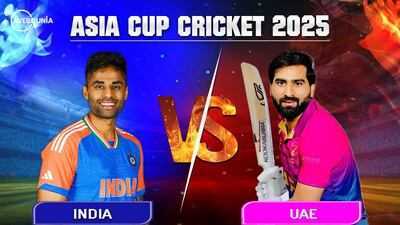

Suryakumar Yadav, now captain, embodies India’s new philosophy — fearless batting. He will guide a lineup that blends explosive talent with emerging consistency.
Vice-captain Shubman Gill returns to T20Is after more than a year, eager to reclaim his place at the top. At the other end will be Abhishek Sharma, whose blistering 135 off 54 balls against England not only broke records but also announced him as India’s next big-hitting sensation.
Tilak Verma, who averages 82 in his last nine matches, represents the calm balance in an otherwise attacking order. With Sanju Samson adjusting to a middle-order role and Hardik Pandya providing both bat and ball, India’s core looks refreshed yet ambitious. Shivam Dubey adds depth as a power-hitting all-rounder.
While the batting exudes youth, the bowling still leans on the experience of Jasprit Bumrah. Alongside Arshdeep Singh, he leads an attack that has bite up front. Spin duties are expected to be shared between Varun Chakravarthy, who has 26 wickets in his last 10 games, and Kuldeep Yadav, whose wrist-spin continues to trouble top-order batsmen worldwide.
The UAE, who earned their spot by winning the ACC Men’s Premier Cup 2024, approach the contest as underdogs but with growing confidence. Captain Muhammad Waseem, known for his fearless striking, will aim to give his side brisk starts.
Alishan Sharafu and Asif Khan, the latter a noted finisher, add punch to the middle order. Their bowling hopes rest on Haider Ali’s wicket-taking form and the experience of Junaid Siddique.
However, history and current form weigh heavily against them. The only T20I between the sides, played in 2016, saw India stifle the UAE for 81/9 before racing to victory in just over 10 overs.
The pitch in Dubai is known to offer balance but slightly favours chasing teams. Out of 110 T20Is played at the venue, 58 have been won by sides batting second. The weather on match day will be typically Gulf — hot, dry, and testing, with temperatures likely touching 40°C.
While India are overwhelming favourites with a 98 percent win probability, the true significance of this match lies elsewhere. It is the unveiling of India’s future. With Kohli, Rohit, and Jadeja gone, the focus shifts to whether the new generation — Gill, Abhishek, Tilak, and others — can carry the weight of expectations.
For fans and observers alike, the clash against the UAE may not be remembered for its competitiveness, but for marking the moment Indian cricket stepped into its post-giants era, ready to forge a fresh identity on the global stage.